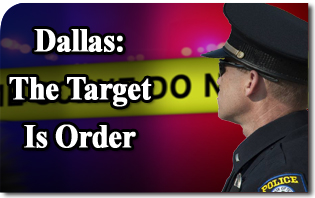 Dallas was not just another attack by a lone shooter against defenseless civilians. Rather, it was a highly symbolic act against those who defend order.
Dallas was not just another attack by a lone shooter against defenseless civilians. Rather, it was a highly symbolic act against those who defend order.
The target was order. The target was the uniforms and badges the officers were wearing. Those who died were merely representatives of order. They were the defenders of the principles and institutions around which society agrees to be organized.
Defending this order is made more difficult by the fact that the Dallas massacre was directed against an order of things that is decaying. As society unravels, the order that once united us as a people is also coming apart. Our political leadership no longer strongly defends society’s core principles. Those who target this weakened order know that revolutions always take place against decaying orders, not healthy ones.
The order that used to unite us together as a people was a social consensus that centered on an array of principles, social institutions and religious beliefs that enriched and gave meaning to our lives. The warm social bonds of family, local communities and faith were the glue that gave unity and purpose to the nation. A moral code based on the Ten Commandments gently informed order and encouraged civility in society.
When this order prevailed, it was harder for deeds like those in Dallas to occur. A person was part of society, and a crime brought dishonor upon oneself, one’s family and community. It was also harder for a policeman to make judgment errors since he also was part of the community. His role was more often keeping watch over those he knew, rather than engaging violent criminals he did not know.
Such a description appears almost idyllic today, but everyone back then knew it was not a perfect society. It had defects and limitations as all societies do. It was a system laden with duties and responsibilities. However, with an admirable can-do attitude, we did not founder among our shortcomings but worked hard to overcome them, with great confidence in God and only minimal assistance from government.
We should see the Dallas terrorist attack in this context.
These sniper kills were not about the color of one’s skin or any other narrative created to obfuscate the issues and fan discontent. The subversives who openly support Dallas-type violence direct their hatred against what remains of the American consensus and the structures of order that used to unite us as a people.

The underlying philosophy behind the nation’s unrest is the extreme individualism born in the sixties. We have established a situation where individuals have set themselves up in their own little worlds with their own sets of rules. It is a social world that Alasdair MacIntyre calls “a meeting place for individual wills, each with its own set of attitudes and preferences and who understand that world solely as an arena for the achievement of their own satisfaction.”
In the frenetic intemperance of our days, so many want everything instantly, effortlessly, and without hardship. They howl with indignation and resentments when others deny them the object of their desires. When an institution demands of them responsibilities beyond their gratifications, they call for its suppression. When personal rules run contrary to public laws, order breaks down.
It is no coincidence that nearly all our recent atrocities happen against a backdrop of broken families, shattered communities, and empty churches that blight our social landscape.
Those who see order as impermissible restraint and swap liberty for license take advantage of our social weakness to peddle politicized narratives that foment unrest against order.
In times such as ours, there should be political leaders, educators, parents and priests with the courage to defend the order we so desperately need. They should be on the front lines in the fight for our culture. Instead, so many of them can be seen yielding to the demands of microaggressed millennials or surrendering to the tyranny of political correctness.
In contrast, we see courage in the policeman who is sent to do a job that is not properly his. He is sent to represent and defend an order abandoned by many of its leaders. Nevertheless, obedient to his honorable calling, the policeman risks everything he has in the fulfillment of his duty. He goes out to protect that decadent society which refuses to be serious about defending itself and tumbles to its ruin. He advances into the line of fire to shield the rest of us, even those calling for his death. Every day, as he comes on duty, he is ready to die to defend the remnants of order, safeguard the public peace, and uphold the common good of the nation. Indeed, the thin blue line is the last low rampart between order and chaos.
Thus, more than just our support, the police officer deserves our profound respect and admiration. And those who foment social disorder ought to be denounced and rejected.
Indeed, we must remember the target is order. Once order is gone, there is nothing left. As Russell Kirk said, “Order is the first need of the soul” without which there can be no law, justice, or freedom.
As seen on American Thinker.
VIDEO: 2016 Dallas Police Memorial Ceremony

